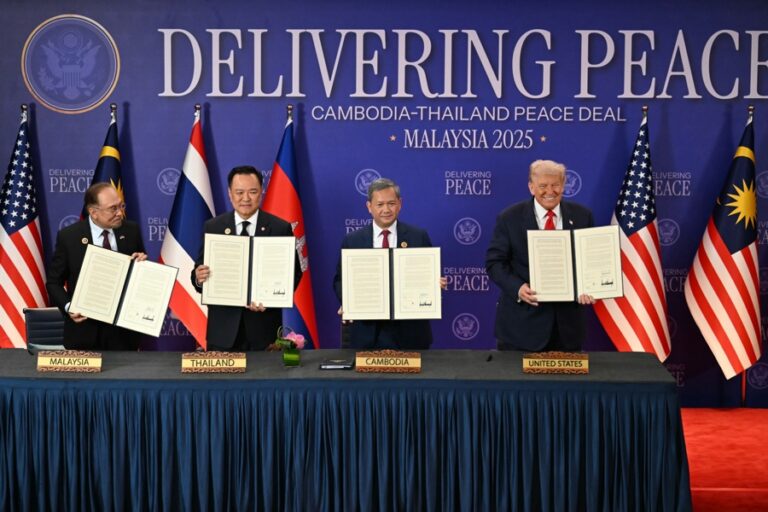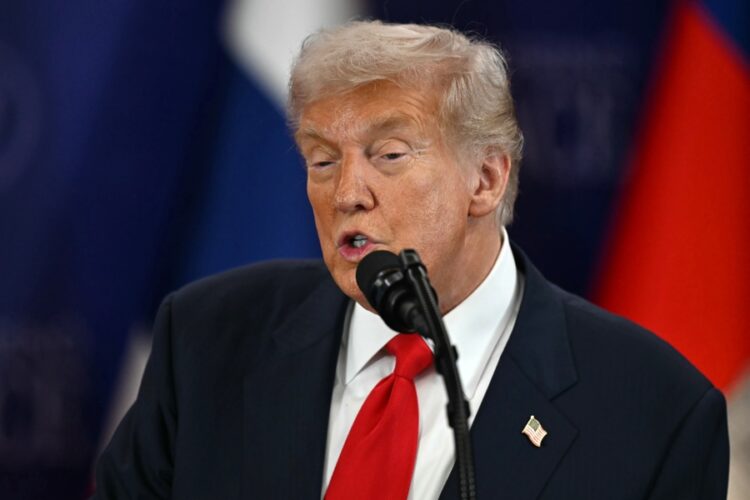
“Historic Agreement” between Thailand and Cambodia!
Kuala Lumpur, Oct 26 (EFE).-
United States President Donald Trump announced the signing of a “historic agreement” between Thailand and Cambodia, which have a border dispute, during a ceremony with the leaders of each country on the occasion of the Association of Southeast Asian Nations (ASEAN) summit in Kuala Lumpur on Sunday.

“This is a momentous day for all of the people of Southeast Asia as we sign a historic agreement to end the military conflict between Cambodia and Thailand,” Trump said in a speech from the Kuala Lumpur Convention Center, where he arrived earlier in the day on the first stop of his Asian tour that will also take him to Japan and South Korea.
Thailand and Cambodia signed the new peace agreement, in the presence of the US president, who mediated the negotiations, following a five-day border conflict between the two countries in July, which left 50 dead.
Both sides had then signed a ceasefire agreement, which they have accused each other of violating in recent months.

“This is one of eight wars that my administration has ended in just eight months,” Trump said, while announcing the pact, which he called the “Kuala Lumpur Peace Accords.”
“I’m proud to settle this conflict,” the leader added.
In July, Trump threatened Thailand and Cambodia with postponing trade agreements amid negotiations over high tariffs targeting Southeast Asia if they did not sign a ceasefire.

According to the joint statement between Thailand and Cambodia, released by the White House, the neighboring countries agree to cease hostilities and commit to allowing the deployment of regional observers in the conflict zone, as well as the release of 18 Cambodian prisoners of war, among other matters.

“Today marks a historic moment of profound significance for Cambodia and Thailand — a day where we affirm our shared conviction that peace is always possible,” Cambodian Prime Minister Hun Manet said.
The leader of Cambodia, a country very close to China, also expressed his deep gratitude to Trump, whom he once nominated for the Nobel Peace Prize.
“Today marks a new chapter for Thailand and Cambodia. We take a concrete step towards peace,” Thai Prime Minister Anutin Charnvirakul said.

Bangkok and Phnom Penh share approximately 820 kilometers of border, which was mapped by France in 1907, when Cambodia was its colony, and they have a long-standing territorial dispute over the sovereignty of some territories.
Trump also vowed to “very quickly” resolve the conflict between Pakistan and Afghanistan, which experienced a serious bout of armed clashes along their border last week and are currently under a ceasefire and peace negotiations.
“I’ll get that solved very quickly,” Trump said regarding the conflict.
The president said that after having stopped eight wars during his second term, there was “only one left,” referring to the conflict between Islamabad and Kabul.

“I know them both very well. Pakistan’s field marshal (Asim Munir) and the prime minister (Shehbaz Sharif) are great people, and I have no doubt we’re going to get that done very quickly,” Trump added.
Representatives of the Pakistani government and the de facto Afghan government met on Saturday in Istanbul to discuss possible solutions to their crisis, which is currently on hold at the armed level after the two countries reached a ceasefire in Doha on Oct. 19, brokered by Qatar and Turkey.
However, the positions of Islamabad and Kabul remain firm. Pakistani Defense Minister Khawaja Asif warned the Taliban of the possibility of “open war” if bilateral peace talks fail.
For their part, the fundamentalists clarified that the Doha ceasefire does not imply that Afghanistan accepts the Durand Line as the official border with Pakistan.
This porous border, drawn by the British Empire in 1893, delimits the current territories of the two states over more than 2,600 kilometers and has been a constant source of tension.

Beyond border disagreements, Islamabad accuses Kabul of providing refuge on its territory to members of the Tehreek-e-Taliban Pakistan (TTP) or Pakistani Taliban—ideological brothers of the Afghan fundamentalists—who, according to the Pakistani government, carry out terrorist acts in the northwest of the country.
Kabul denies these accusations. EFE mca-nc-pav-jgv/pd




